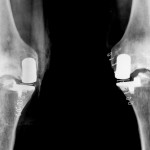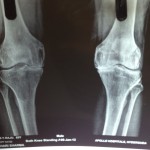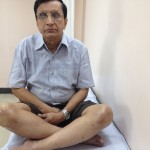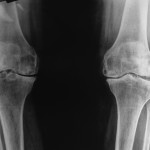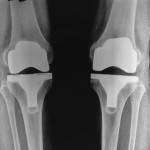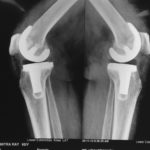TOTAL KNEE REPLACEMENT (TKR)
There are a number of conditions that can result in a patient having to undergo knee replacement surgery. Perhaps the most common condition is osteoarthritis, commonly referred to as ‘wear and tear’ arthritis. If the pain in your knee affects your quality of life, and you can’t be as active as you would like to be, it’s time to take a look into a knee replacement.
Total knee replacement in its current form has been around for over 25 years. In India, popularity has grown over the last 10 years. This is a good operation for pain and correction of deformity in the knee. Results of total knee replacement are excellent with survivorship of almost 95% at 10 years and 85% at 20 years. Like with any profession, the job has to be well done for the knee to survive long and the implant material has to be good too. Most knee implants in India are imported, although of late, one particular Indian brand has been showing promising results.
Most foreign knee implants are broadly similar in design although there are significant subtle differences. Overall functional results are broadly similar no matter what implant is used. More recently, some companies are making many sizes available so that the fit is optimal. These implants tend to be more expensive.
The most common technique of knee replacement is using standard company supplied instruments, which are very accurate. However, to increase accuracy computer guided knee replacement is available but not commonly used, as the functional results have not been found to be any better. Custom made jigs can also be made available for more accurate implantation. This technique has not been very popular as it involves additional cost of an MRI and the lead time is 3 weeks for the jigs to be made in USA and then sent over here.
PARTIAL(UNICONDYLAR) KNEE REPLACEMENT
This is an excellent procedure when arthritis affects just one or two compartments out of the three. It is a minimally invasive procedure performed through a small incision of 6 cms or less. The joint therefore feels and behaves more like a normal knee. Recovery is rapid and the patient is often discharged within 2 – 3 days of surgery.
PATELLO-FEMORAL REPLACEMENT
This is a relatively new procedure. It is indicated in patients with primarily patello-femoral (Arthritis of the knee cap). Recovery is usually rapid & patients are often discharged within 2 – 3 days of surgery.
REVISION KNEE REPLACEMENT
Primary knee replacements do fail in for a number of reasons. Regular follow-up is essential for people with primary joint replacements. Revising them is highly specialised surgery requiring extensive training and access to sophisticated implants and hospital facilities. The old implant is removed and replaced with new. Surgery may involve use of bonegraft and/ or custom made implants. Identifying failing joint replacements early is crucial for a successful outcome and therefore a regular follow-up by an orthopedic surgeon is advised. Dr Udai Prakash has a particular interest in Revision hip and knee surgery and has been fellowship trained in this work.
MINIMALLY INVASIVE SURGERY
Udai Clinic has expertise to provide true minimally invasive procedures like knee and ankle arthroscopy (keyhole surgery). Hip and knee replacements are also done using smaller incisions (minimal incision surgery or MIS) and advanced anaesthetic pain relieving techniques. Hip resurfacing surgery in particular, is done through a minimally invasive muscle sparing technique. This technique allows for a more rapid recovery with minimal postoperative discomfort.
KNEE ARTHROSCOPY (KEY HOLE SURGERY)
This is one of most common procedures performed on the knee. Generally performed under anaesthetic as a day procedure, recovery is rapid and results gratifying.
Surgeons at Udai OMNI are specially trained to perform this procedure for many conditions including:
- Meniscal tears (cartilage tears)
- Knee debridement and microfractures
- Synovitis
- Anterior Cruciate Ligament tears (ACL)
- Loose bodies

